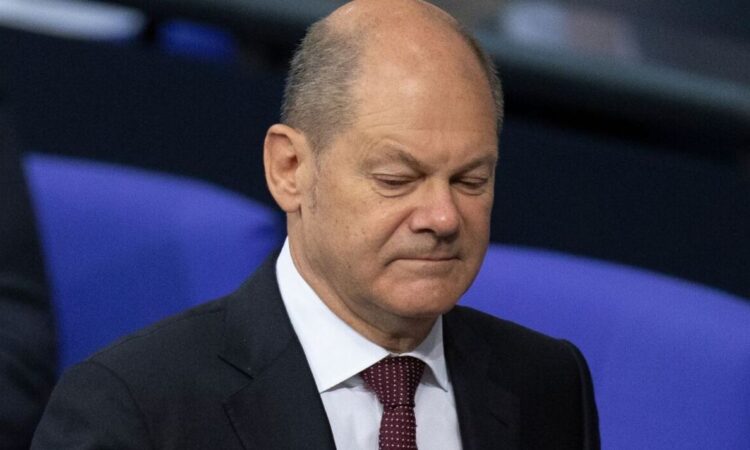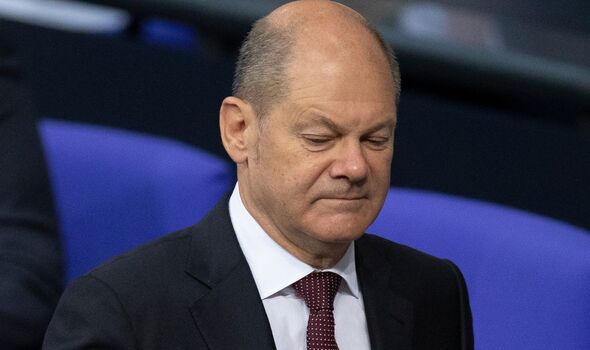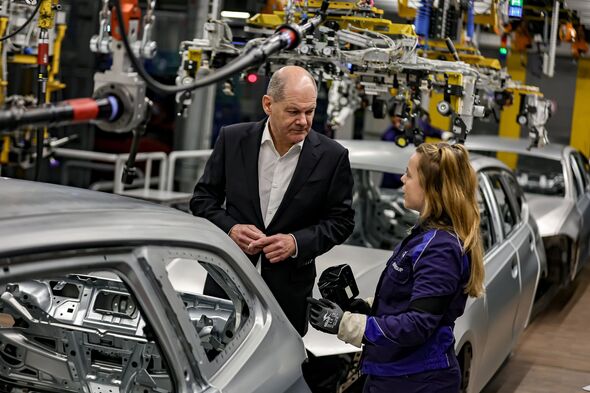Germany blasted as ‘failed state’ as economy stumbles – while UK set to steam ahead | World | News


Mr Scholz is facing brutal approval ratings as Germany faces recession (Image: Getty)
The German economy has been blasted as unable to cope with global shocks as Olaf Scholz scrambles to stabilise – while the UK shows signs of promise.
The western European country, once considered a miracle economy for the EU, is now facing sweeping strikes from railway staff, lorry drivers and farmers, among others. Their protests range from grievances over pay and conditions, to cuts in their agricultural subsidies and higher road tolls.
Germany’s focus on manufacturing is slowing it down as economic upsets across the world – particularly the Russian invasion of Ukraine and China’s slow economy – wreak havoc on Berlin’s major exports. More than halfway through Mr Scholz’s four-year term, 82 percent of German voters are less than happy or not at all happy with his coalition as a major industry boss describes the government as a “failed state”.
The UK, by comparison, while suffering from the same shocks and the shake-up of Brexit, has increased its focus on services exports, helping to weather the economic storm.
At the end of last year the most recent statistics showed the German economy contracted by 0.4 percent year-on-year in the third quarter of 2023 following a 0.1 percent expansion in the previous three-month period.
This decline has been largely attributed to the performance of the “manufacture of machinery and equipment” sector. According to the Federal Statistical Office, production in this sector was down 6.3 percent month on month.
The IMF predicts Germany will be the only G7 economy to have shrunk in 2023. Meanwhile, according to a report from the CEBR, the UK economy is set to retain its sixth-placed global ranking in 2024, closing in on Germany and leaving France behind.
Advisory firm PwC’s chief economist Barret Kupelian has similarly estimated the UK will be the fourth-best performing economy in the G7 this year ahead of France, Germany and Japan, with real GDP (gross domestic product) around 2.7 percent higher than 2019.
Experts warned that the UK could still suffer from a lack of growth and plunge into recession, however.
The problems are partly circumstantial for Germany, as demand for the goods Germany’s export sector mainly produces – machinery, cars, tools, and chemicals – fluctuates according to the state of the wider economy.
The country is particularly reliant on the exporting of these goods, too. In 2021, its four largest groups of exported goods made up almost half of the Germany’s overall exports: vehicles and vehicle parts (15.3 percent), machinery (14.2 percent), chemical products (10 percent) and computer/electrical and optical equipment (8.8 percent).
China is Germany’s primary customer, with the Federal Statistical Office (Destatis) reporting it was Germany’s most important trading partner in 2022 for the seventh consecutive year. However, China’s unexpected economic slowdown in recent years has led to a fall in demand for German goods.
A growth in cheap Chinese electric cars and incentives provided by Joe Biden’s Inflation Reduction Act for low-carbon manufacturing to migrate to the US have also negatively impacted Germany’s manufacturing powerhouse.

Germany’s focus on car manufacturing has left it vulnerable to economic shocks (Image: Getty)
- Support fearless journalism
- Read The Daily Express online, advert free
- Get super-fast page loading
By comparison, where trade is concerned, the UK has more of a focus on services, with a total of £464billion exported in services compared with £404billion in goods last year, according to Government stats as of December 20 2023.
Meanwhile, Russia’s war in Ukraine drove gas prices through the ceiling. This affected economies across the globe – but as the largest exporter of automobiles, Germany particularly felt the heat.
It also exposed why Berlin’s issues may not be purely the result of current circumstances.
David Marsh, the chair of the thinktank OMFIF, told the Guardian: “Something structural is going on there. Many times in the past people have called time on the German economy and the German economy has always bounced back. This time it might be slightly different.”
Mr Marsh argued after Angela Merkel committed to shutting down all of Germany’s nuclear power stations in 2011 months after the Fukushima disaster in Japan, the country became over-reliant on cheap Russian gas to meet its energy needs. “They put all their eggs in the Russian basket,” he said.
Economists have also pointed to the country’s rapidly ageing population, lack of recent major investment in infrastructure and high corporate tax rates.
Mr Scholz’s government has partly been blamed for a failure to digitise and give the country the responsiveness it needs to cut through bureaucracy and react to economic shocks.
The head of Germany’s digital industries association, Bitkom, has called the country a “failed state” in terms of its digital government services – with building permits, operating licences and company registrations all taking far longer to process than the average for the EU.
Meanwhile the coalition of Greens, the neo-liberal FDP and centre-left SPD is straining at the seams as each party aims to distinguish itself from the failures of the whole. The Greens are reportedly reluctant to compromise on the environment and social spending, while the FDP refuses to lift a brake on constitutional debt and is instead calling for big budget cuts.






